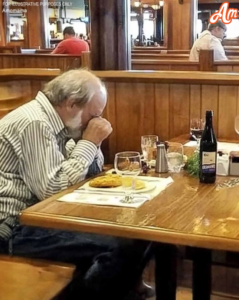I Served an Elderly Man Dinner for Two, but When No One Came, I Uncovered a Truth That Left Me Stunned
Working as a waitress at a cozy family-owned restaurant, I had seen all kinds of customers—young couples on dates, families celebrating birthdays, and elderly regulars who came in for their usual meals. But one particular night, I had an encounter that changed my perspective on love and loss forever.
It was a quiet evening when an elderly man walked in and requested a table for two. His name was Mr. Andrews, a gentle man with kind eyes and a neatly pressed suit. He looked dapper, as if he were preparing for a special occasion. I greeted him warmly and led him to a small table by the window.
As I handed him the menu, he smiled and said, “No need, dear. I already know what we’d like.” He ordered two plates of spaghetti with marinara sauce, a small garden salad, and a glass of red wine. His order was precise, as if it had been rehearsed a hundred times.
I nodded and placed the order, assuming his guest would arrive soon. But as the minutes passed, I noticed that he continued glancing at the empty chair across from him, his fingers absentmindedly tracing the rim of his wine glass. Something about his gaze felt nostalgic, almost wistful.
After a while, I hesitated before approaching him again. “Would you like me to keep the other plate warm for your guest?” I asked gently.
He looked up at me and smiled sadly. “Oh, she’ll be here,” he said, tapping his temple. “She always is.”
Confused, I walked back to the counter and observed from a distance. He carried on as if someone were sitting across from him—raising his glass slightly, speaking in hushed tones, and even pausing as if listening to a response.
My curiosity got the better of me. As I refilled his water, I cautiously asked, “Is it a special occasion tonight?”
He chuckled softly. “You could say that. My wife and I used to come here every Friday for dinner. It was our tradition for over 40 years. Even after she passed, I couldn’t bear to break it.” He looked at the chair across from him, his eyes glistening. “So, I still bring her with me.”
A lump formed in my throat. I had served many customers, but none whose love transcended even death. Mr. Andrews wasn’t waiting for someone to arrive—he was keeping the memory of his beloved wife alive in the most touching way.
That night, I made sure his dinner was perfect. I refilled his wine glass, brought an extra napkin to the empty seat, and even placed a small flower from our centerpiece near his wife’s imaginary plate. When he left, he tipped generously and whispered, “Thank you for treating her like she was still here.”
I watched him walk away, realizing that love, in its purest form, never truly fades—it lingers, waiting at a table for two.
